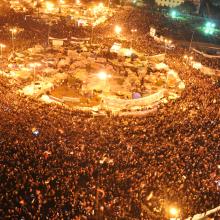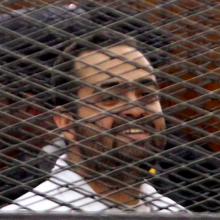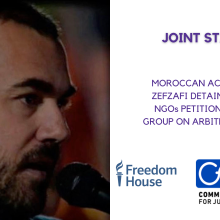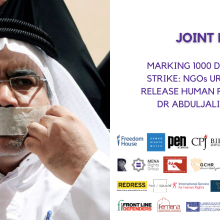14 ديسمبر 2021
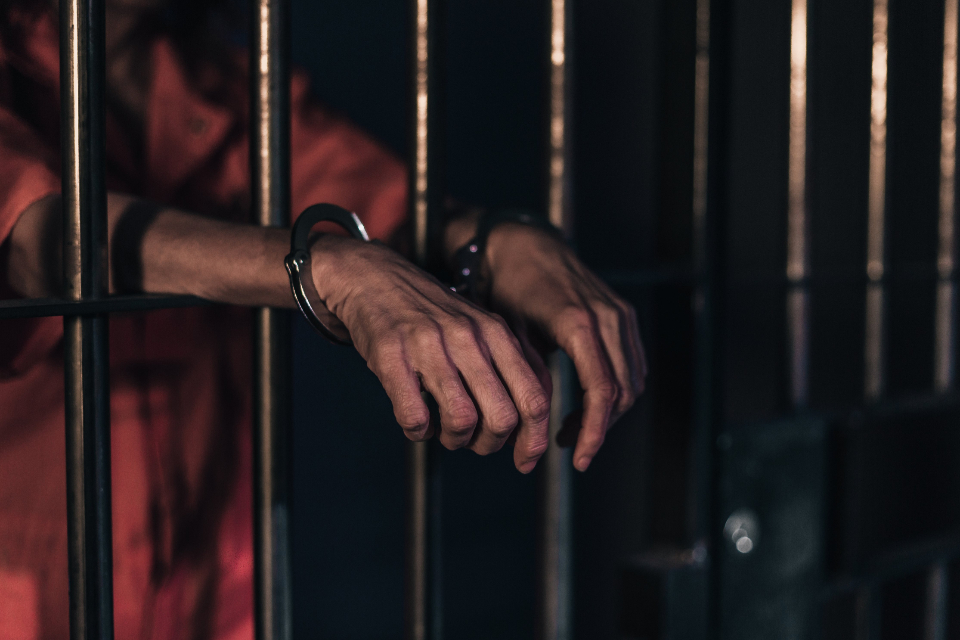
Prison Bars Photo © Matthew Henry, licensed under CC0 1.0.
Background
Since 2014, the human rights situation in Egypt has deteriorated significantly, with the Egyptian authorities having obliterated almost all space for free expression, peaceful assembly and association.[1] Accompanying the shrinking of civic space under the current presidency of Abdel Fattah Al Sisi is the increasing use of pre-trial detention.[2] Security forces, in coordination with prosecutors and judges, have arrested, detained or prosecuted thousands of individuals, including hundreds of human rights defenders, peaceful demonstrators, lawyers, members of the political opposition, journalists, artists, religious minorities’ rights activists and academics.[3]
Recently, the authorities have effectively begun circumventing the pre-trial detention maximum periods through the practice of “rotation” (tadweer). It is now often being used as a punitive measure against peaceful dissenting voices in Egypt by subjecting them to de facto indefinite detention.
The practice of rotation raises serious due process and fair trial concerns: Lawyers of persons subjected to the practice have previously reported that their clients were never presented with credible evidence in relation to the new accusations brought against them, nor was any of the reasonable grounds set forth by the Code of Criminal Procedure (CCP) for an order of pre-trial detention to be legally given.[4]
According to sources on the ground, most of the interrogations at the Supreme State Security Prosecution (SSSP) happen in an almost theatrical fashion: The prosecutor reportedly asks questions about the accusations, and the accused generally denies them. Then their lawyers submit a short defence statement. In practice, the intervention of the defence lawyer and the accused has no impact on the outcome of the interrogation, which systematically ends with a renewal of the detention. The sole aim of such hearings is to legitimise the defendant’s continued detention.
In the first interrogation session, the SSSP usually states the accusations. However, these accusations can change until the case is referred to trial, where the charges are formally pressed. At the stage of pre-trial detention, the defendants do not know the legal bases on which these accusations are based, as the prosecution would not let them know, thereby creating a feeling of uncertainty for the accused reinforced by the fact that neither the defendants nor their lawyers generally have access to the case file.
The number of affected persons has, with the increasing influence of the SSSP in recent years, been growing and only a few are submitted to court.[5] In recent years, lawyers have in addition reported to have faced significant obstacles to communicating and supporting their clients.[6] The prolonged pre-trial detention in extremely poor conditions also affect an individual’s right to life, dignity and health, among others, as many have developed severe health problems in detention, while being denied adequate medical care. In addition, the state of anguish created by the feeling of uncertainty is such that it amounts to torture.
Lastly, some of the accused are intermittently released on precautionary measures, which qualify as additional punishments to the prolonged arbitrary pre-trial detention: They often severely restrict the affected person’s liberty for a long time after their release and have repeatedly preceded a later arrest.
Types of rotation
Rotation[7] occurs when an individual who (i) is serving a sentence, (ii) is in pre-trial detention, (iii) has recently completed a sentence, or (iv) has recently been ordered released from pre-trial detention, is questioned and detained in relation to a new case. Accordingly, with every new case the pre-trial detention period begins anew, contributing to a situation in which an individual could be kept in pre-trial detention de facto indefinitely, so long as they are ordered detained in new cases.
The practice is not formally regulated under Egyptian law.[8] It has rather been enforced by the country’s security authorities, such as the SSSP. They play a significant role in the adding of persons to new cases and the fabrication of accusations – which the defendants are sometimes even accused of having committed from inside their detention cells, even if they were placed in solitary confinement.
There are two primary types of rotation:[9] those that take place during or following pre-trial detention; and those that take place following the completion of a sentence.
1) During or following pre-trial detention
Detention in two cases: Authorities order an individual into pre-trial detention under two different cases from the onset of their arrest. This leads to continued detention, because even if the individual is ordered released in one case, they would remain in pre-trial detention in the other case. Oftentimes, the individual faces similar accusations in both cases.
New case following months of detention: Authorities would investigate and order the individual into pre-trial detention in a second case while they have already been in detention in connection with a first case. Even if an individual is ordered to be released in the first case, they would remain in detention in relation to the second. Again, the individual oftentimes faces similar potential accusations in both cases.
New case following a release order: This is the most common form of rotation. An individual has been ordered released from pre-trial detention in a particular case. However, they are not physically released in spite of the prosecutorial or court order. Instead, they are questioned in an entirely new case and then ordered back into pre-trial detention. There is often an inherent contradiction to these cases, as the new case refers to acts allegedly committed when the accused was already held in pre-trial detention.
New case following release and while on probationary measures: The individual has been released from pre-trial detention but is made to serve probationary measures, which often mean that they must periodically visit their district police station or be brought before a judge. While fulfilling these probationary measures, the individual gets arrested again, is accused of violating these probationary measures, and then is ordered into pre-trial detention in an entirely new case.
2) Following completion of a prison sentence
Detention following the completion of a sentence: An individual has just completed their prison term. However, before they are released, they are questioned in a separate new case and ordered into pre-trial detention.
Detention following the completion of a sentence and during probation: An individual who has completed a prison term and is serving a daily probation requirement under Law No. 99 of 1945,[10] as stipulated by the judge who first sentenced them, is arrested and questioned in an entirely new case, and ordered into pre-trial detention in the said new case.
The pre-trial detention regime under Egyptian law
Egypt’s Code of Criminal Procedures (CCP)[11] details the legal framework for pre-trial detention.
Article 143 CCP sets specific maximum periods of pre-trial detention permissible for different offence categories: pre-trial detention cannot exceed six months for misdemeanours, 18 months for felonies, and two years if the penalty for the crime is life imprisonment or death.[12] In 2013, article 143 of the CCP was amended to grant the Court of Cassation and the Court of Referral the power to extend the pre-trial detention time without any limitation for cases in which death penalty or life imprisonment verdict is appealed and the defendant is going through a re-trial process.[13] In cases of felonies, pre-trial detention can be renewed for 15-day periods by an investigating judge or a prosecutor for 150 days in total (articles 142 and 143 CCP). Beyond that, the renewal of the pre-trial detention can be done in 45-day increments but must be reviewed by a judge.
As most individuals prosecuted in reprisal for exercising their rights to freedom of expression, peaceful assembly, and association face terrorism-related accusations for which the penalty ranges from life imprisonment to capital punishment, their pre-trial detention can be extended up to two years. In some instances, individuals are kept in pre-trial detention even beyond those two years.
Impediments to challenging pre-trial detention
Though under article 164 CCP, defendants have the right to appeal the pre-trial order issued against them as well as the extension of their pre-trial detention, in practice, they face a number of impediments that run against article 9(4) of the International Covenant on Civil and Political Rights (ICCPR), which guarantees the right of any detained person to challenge the legality of the detention before a court (habeas corpus).
The SSSP: a partial reviewing authority with undue powers
In cases of activists and dissidents subjected to pre-trial detention under terrorism accusations,[14] it is the SSSP that is in charge of the investigation.[15] Once the SSSP has exhausted the maximum duration of pre-trial detention – 150 days –, the trial court reviews the pre-trial detention. In cases of terrorism-related accusations, the trial court is the Terrorism Judicial Circuit.
This framework permitting SSSP prosecutors to assume the powers of judges to issue pre-trial detention decisions is flawed: under article 9(3) ICCPR, persons held on a criminal accusation must be brought “promptly” before a judge or another officer authorised by law to exercise judicial power for a judicial control of the detention. The authority reviewing the detention is required to be independent, objective, and impartial which, according to the Human Rights Committee, excludes public prosecutors from such a task.[16] The UN Working Group on Arbitrary Detention (WGAD) has previously deemed that the SSSP was insufficiently independent, objective, and impartial, and expressed concern that over the fact that the SSSP is “nominally ordering preventive detention pending further investigation but in practice enabling indefinite detention without prospect of trial”.[17]
In addition, the SSSP benefits from undue power and influence with further undermines the right to habeas corpus:
In practice, after systematically ordering the accused to be detained and renewing their pre-trial detention in 15-days intervals up to the maximum permissible of 150 days, the SSSP keeps the defendants detained by requesting judges to renew their pre-trial detention.
The SSSP also has the power to decide whether to allow lawyers’ request for appeals against their clients’ detention – ordered by the SSSP or a judge – to be processed by its secretariat or not. An appeal can, for instance, be rejected based on “security concerns”.[18] Amnesty International has corroborated that SSSP prosecutors are in the position to “sabotage” appeals requests.[19]
Lastly, even when detainees receive a release order by the court, the SSSP either always successfully appeals them or maintains them in detention without any legal basis, pending rotation into another new case. In other words, the SSSP thereby has the power to release the person in question at any given moment, but regularly chooses not to.
Systematic renewal vs. measure of last resort
Under article 9(3) ICCPR, once the individual has been brought before the judge, the judge must decide whether the individual should be released or remanded in custody for additional investigation or to await trial. As a general rule, persons awaiting trial shall not be detained: the Human Rights Committee has deemed that pre-trial detention is permissible as an exception only, when it is necessary to “prevent flight, interference with evidence or the recurrence of crime”.[20]
Article 143 CCP equally stipulates that the extension of the pre-trial detention is only permissible if it is in the interest of the investigations, i.e., when they are not yet concluded – otherwise, it is required that the defendant be released.[21] In addition, article 134 CCP enshrines that for a pre-trial detention to be legal, credible evidence must be presented.
However, in practice, defendants’ pre-trial detention, as previously observed by the WGAD, appears to be automatically extended as a common practice.[22] It makes the order and extension of pre-trial detention indeed rather the rule, than the exception and a measure of last resort. What is more, credible evidence is never presented by the prosecution and no justification is ever provided to renew the pre-trial detention.
Right to defence undermined
Under Egyptian legislation, the investigative judge is required to hear the prosecution and the defence before issuing their decision on the pre-trial detention (article 136 CCP) and the accused must be granted the right to contact their lawyer (article 139 CCP). The ICCPR also guarantees that the individual should be brought physically before the reviewing authority and is entitled to legal assistance.[23]
Despite these safeguards, often individuals see their pre-trial detention prolonged in their absence, in the absence of their legal counsel, or, without having been given the adequate time and facilities to prepare their defence with a lawyer. In fact, confidential communications with a legal counsel are systematically denied, if communication with them was permitted.
Moreover, defendants and their counsel are systematically denied access to the relevant documents and other evidence allegedly held by the authorities. Instead, the files on them, containing information gathered by the National Security Agency to be used as evidence against them, are kept secret. In this regard, the WGAD has previously established that counter-terrorism legislation permitting administrative detention and secret evidence as the basis for indefinite detention is inconsistent with the prohibition of arbitrary detention.[24]
Violation of the principle of legality
Under the Egyptian legal system, charges are not final until the case is referred to trial, i.e. when the confirmed charges are listed in the referral order. When individuals are brought before the SSSP, the latter states accusations without providing the legal bases. This ambiguity is reinforced by the fact that neither the defendants nor the lawyers have access to the case files. Most accusations against peaceful activists and dissidents, however, eventually fall under the Penal Code (PC), the Cybercrime or the Anti-Terrorism Law.
The WGAD has previously considered the vague provisions of the PC and of the Anti-Terrorism Law to fall short of the degree of legal certainty required under the lex certa principle and showed concern that they “may be used to deprive individuals of their liberty without a specific legal basis and violate the due process of law underpinned by the principle of legality”.[25]
We also recall that the WGAD has previously found that general prohibitions on the dissemination of information based on vague and ambiguous ideas, including false news or information, are incompatible with international standards for restrictions on freedom of expression and should be abolished, and that overly broad and vague laws criminalising freedom of expression are incompatible with the obligations of Egypt pursuant to the Covenant.[26]
Rotation: A tool to crackdown on peaceful dissent
From the above, it is clear that the defendants’ views and convictions are clearly at the centre of the continuous renewal of their detention: There is a significantly higher probability for a peaceful dissenting person, such as vocal human rights defenders, activists, or politicians, to be subjected to the practice of “rotation” than any other category of persons arrested and detained in Egypt. While common law prisoners might face the practice in certain cases, this has been described by several credible and concurring sources on the ground as to happen rather “randomly” and to be rarer than in the cases of peaceful critics.
New accusations on the basis of which peaceful dissidents are being “rotated” are always related to the exercise of their fundamental rights or to previous legitimate forms of activism or dissent. Accusations commonly include “joining a terrorist group” or “spreading false news to harm national interests”, in reference to membership to peaceful associations or non-violent political parties, and being vocal about certain issues. As such, the practice of rotation itself violates the rights the rights to freedom of expression and freedom of peaceful assembly and association, as well as the right to participate in public affairs. Rotation is thus used as a form of punishment and reprisal against peaceful dissenting voices rather than a tool to pursue justice:
The trials that are due to follow pre-trial detention often do not take place, nor do the investigations, which are supposed to be ongoing to justify the ordering and the extension of pre-trial detention in the first place. Moreover, the accusations brought against the defendants when being added to new cases are entirely fabricated and baseless; respectively based on a severely distorted account of their real activities. They are never presented with any credible evidence, and, in certain cases, the commission of the alleged crimes would even have been impossible for the accused as they were in pre-trial detention already, at times even in solitary confinement. What is more, when rotated into new cases, defendants are usually accused of the very same or almost identical accusations – either after having been released and subsequently rearrested or after having seen the SSSP refuse to implement the release order issued in their regard by a court. This constitutes a violation of the prohibition of double jeopardy enshrined in article 14(7) ICCPR.
In the long run, rotation also aims at preventing defendants from exercising those rights and suppressing any form of criticism by subjecting them to de facto indefinite detention. It affects their physical and mental health as well as their work and activism on the long-term. Finally, it intimidates not only their family members and co-activists, but the Egyptian society as a whole.
No prospect of trial: indefinite detention as a form of torture
Most individuals subjected to the practice of rotation have yet to be brought to trial, in violation of their right to be tried without undue delay enshrined in article 14(3) ICCPR.
In this regard, the WGAD has expressed great concern in relation to the SSSP’s practice of “nominally ordering pre-trial detention pending further investigation but in practice enabling indefinite detention without prospect of trial”.[27]
This raises concern not only in terms of due process and fair trial guarantees; the state of uncertainty it creates for pre-trial detention also amounts torture:
In Egypt, detainees are held in deplorable, inhumane detention conditions; many have either seen pre-existing health conditions deteriorate or have developed serious medical conditions while in pre-trial detention, also due to the restriction or outright denial of medical care. In addition, the overuse of pre-trial detention contributes to prison overcrowding, and thus exacerbate poor prison conditions and the risk of torture and other forms of ill-treatment. This breaches the right of every person detained to be treated with humanity and with respect for their inherent dignity, as enshrined in articles 10(1) ICCPR.
In addition, the practice of prolonged, and in some cases repetitive, detention of peaceful dissidents that is not based on any reasonable accusation has a severe impact on the defendants’ mental health by creating a state of unpredictability and uncertainty.[28]
Therefore, the practice of rotation which effectively permits the authorities to detain complainants indefinitely, puts them in a state of anguish that is such that it amounts to torture under article 7 ICCPR.
Conclusion
The present analysis is based on a request for Opinion MENA Rights Group filed with the WGAD on December 2, 2021, on behalf of Ola Al Qaradawy, Abdulrahman Ahmed (“Moka”), Abdelmoneim Abu El Foutouh, Alaa Abdelfattah, Ibrahim Metwally, Mohammed El Qassas and Haitham Mohamadein. Their situation illustrate the practice of “rotation” described above, which is increasingly being used by the authorities to circumvent the maximum periods of pre-trial detention, and raises serious due process and fair trial concerns. We asked the WGAD to call on the Egyptian government to take all necessary steps to remedy the situation of the complainants without delay and bring it into conformity with the relevant international and regional norms.
Special thanks to TIMEP’s former legal associate Yasmin Omar for her support throughout our research.
[1] Amnesty International, States break silence to condemn Egypt’s abuses at UN rights body, 12 March 2021, available at: https://www.amnesty.org/en/latest/news/2021/03/states-break-silence-to-condemn-egypts-abuses-at-un-rights-body/ (accessed on 9 September 2021).
[2] TIMEP, Indefinite Pretrial Detention in Egypt: Rotation and Detention Pending Multiple Cases, 9 February 2021, available at: https://timep.org/explainers/indefinite-pretrial-detention-in-egypt-rotation-and-detention-pending-multiple-cases/ (accessed on 8 September 2021).
[3] “States break silence to condemn Egypt’s abuses at UN rights body”, op. cit.
[4] EuroMed Rights, The chilling effect – A study on the use of pre-trial detention as a tool of repression against human rights defenders and activists in Egypt, March 2020, available at: https://euromedrights.org/wp-content/uploads/2020/03/Chilling-Effect-of-Pre-Trial-Detention-on-Human-Rights-Defenders-in-Egypt.pdf (accessed on 9 September 2021), pp. 5 and 16.
[5] Amnesty International, Permanent state of exception – Abuses by the Supreme State Security prosecution, 2019, available at: https://www.amnesty.org/en/wp-content/uploads/2021/05/MDE1213992019ENGLISH.pdf (accessed on 9 September 2021), pp. 7, 18 and 55 and “ The chilling effect – A study on the use of pre-trial detention as a tool of repression against human rights defenders and activists in Egypt”, op. cit.. pp. 5 and 18.
[6] “The chilling effect – A study on the use of pre-trial detention as a tool of repression against human rights defenders and activists in Egypt”, op. cit., p. 18.
[7] This part is based on the analysis produced by TIMEP. See: “Indefinite Pretrial Detention in Egypt: Rotation and Detention Pending Multiple Cases”, op. cit.
[8] “Indefinite Pretrial Detention in Egypt: Rotation and Detention Pending Multiple Cases”, op. cit.
[9] Ibidem.
[10] Available at: https://site.eastlaws.com/GeneralSearch/Home/ArticlesTDetails?MasterID=271829&related&MasterID=271829&related (accessed on 9 September 2021).
[11] Available at: https://manshurat.org/node/14676?fbclid=IwAR0jQw_sPBHmSs0uYrUltU_8D1_-wK4MwfkZXFmXF6DAXgUHv3Oy0BxpI3g (accessed on 9 September 2021).
[12] “Indefinite Pretrial Detention in Egypt: Rotation and Detention Pending Multiple Cases”, op. cit.
[13] Ahram, قرار جمهورى بتعديل مدة الحبس الاحتياطى فى قانون الإجراءات الجنائية, 25 September 2013, available at: https://gate.ahram.org.eg/News/399445.aspx (accessed on 9 September 2021).
[14] “The chilling effect – A study on the use of pre-trial detention as a tool of repression against human rights defenders and activists in Egypt”, op. cit, p. 5.
[15] Ibid., p. 16.
[16] Ibid., para. 32.
[17] Working Group on Arbitrary Detention, Opinion No. 14/2020 concerning Amal Fathy, Mohamed Lofty and a minor whose name is known to the Working Group (Egypt), 18 June 2020, UN Doc. A/HRC/WGAD/2020/14, para. 52.
[18] “Permanent state of exception – Abuses by the Supreme State Security prosecution”, op. cit., p. 8.
[19] Ibidem.
[20] Human Rights Committee, General comment No. 35 – Article 9 (Liberty and security of person), 16 December 2014, UN Doc. CCPR/C/GC/35, para. 38.
[21] “The chilling effect – A study on the use of pre-trial detention as a tool of repression against human rights defenders and activists in Egypt”, op. cit., pp. 17 and 22.
[22] “Opinion No. 14/2020”, op. cit., para. 52.
[23] “General comment No. 35 – Article 9 (Liberty and security of person)”, op. cit., para. 34.
[24] Human Rights Council, Report of the Working Group on Arbitrary Detention, 24 December 2012, UN Doc. A/HRC/22/44, para. 72.
[25] “Opinion No. 14/2020”, op. cit., para. 58.
[26] Joint Declaration on Freedom of Expression and “Fake News”, Disinformation and Propaganda, para. 2 (a). The Joint Declaration was adopted in Vienna on 3 March 2017 by a group of experts that included the Special Rapporteur on the promotion and protection of the right to freedom of opinion and expression. See also WGAD Opinion No. 77/2020.
[27] “Opinion No. 14/2020”, op. cit., para. 52.
[28] “The chilling effect – A study on the use of pre-trial detention as a tool of repression against human rights defenders and activists in Egypt”, op. cit., pp. 19-20.




